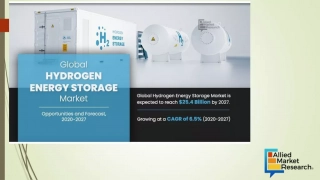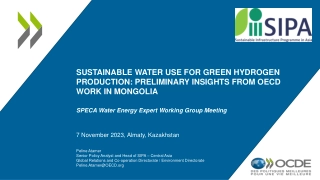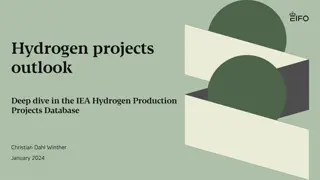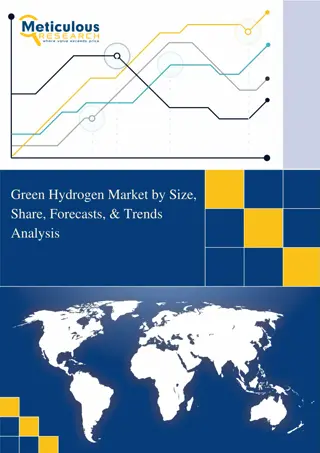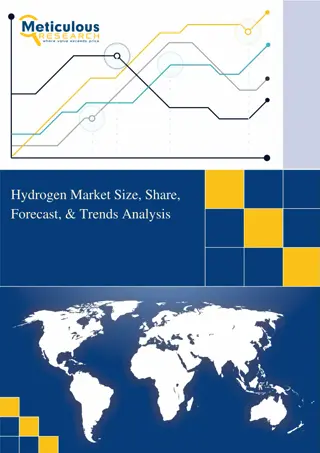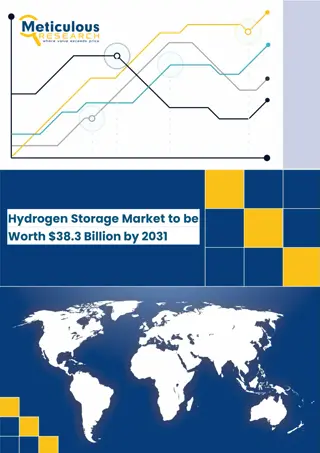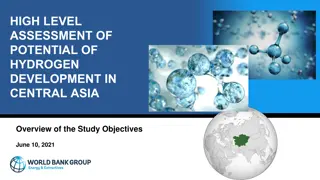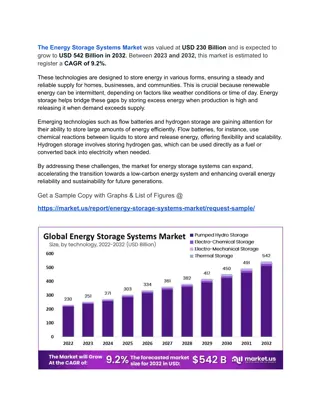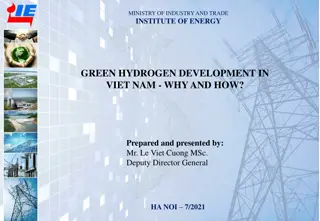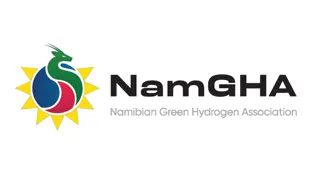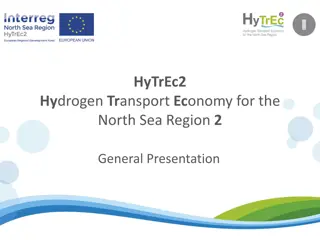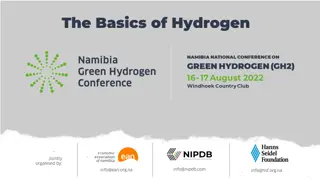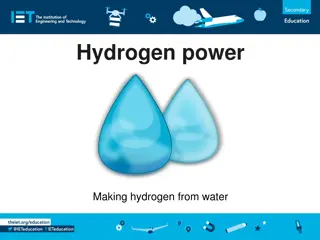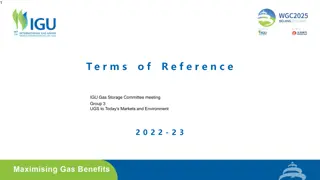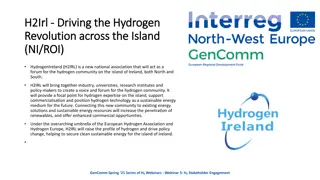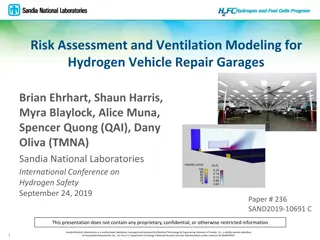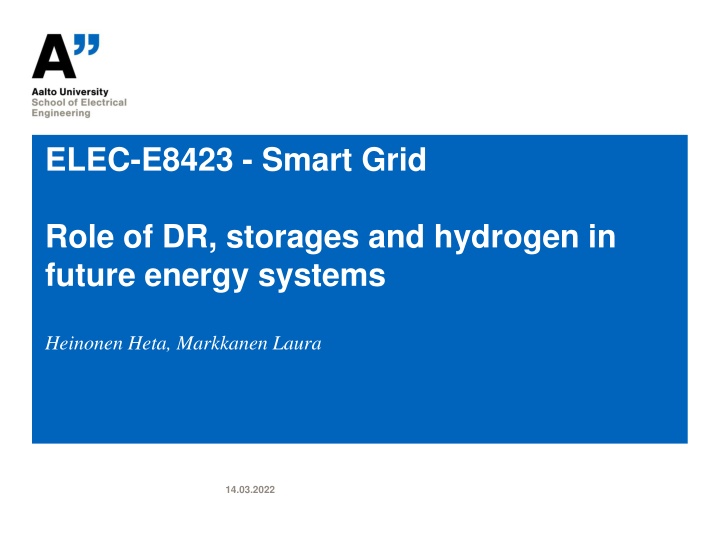
Future Energy Systems: Role of DR, Storage, and Hydrogen
As renewable energy sources increase, the need for Demand Response (DR), energy storage, and hydrogen in smart grids grows. Explore the benefits of DR, the importance of energy storage in managing unpredictable loads, and the potential of hydrogen energy production. Discover how these elements will shape the future of energy systems.
Download Presentation

Please find below an Image/Link to download the presentation.
The content on the website is provided AS IS for your information and personal use only. It may not be sold, licensed, or shared on other websites without obtaining consent from the author. If you encounter any issues during the download, it is possible that the publisher has removed the file from their server.
You are allowed to download the files provided on this website for personal or commercial use, subject to the condition that they are used lawfully. All files are the property of their respective owners.
The content on the website is provided AS IS for your information and personal use only. It may not be sold, licensed, or shared on other websites without obtaining consent from the author.
E N D
Presentation Transcript
ELEC-E8423 - Smart Grid Role of DR, storages and hydrogen in future energy systems Heinonen Heta, Markkanen Laura 14.03.2022
Introduction As more unstable renewable energy sources are added to the grid, the imbalance between supply and demand increases. Demand response (DR) and energy storage solutions have been developed to fight this issue, and are likely to play an important role in future energy systems. Presentation contents: DR in smart grids The role of energy storage systems Hydrogen in smart grids Conclusions Source material 14.03.2022 Page 2
Demand response DR definition: Changes in energy usage of consumers in response to changes in the price of electricity over time Incentive payments to reduce electricity usage during high wholesale market prices or when system reliability is jeopardized Electricity usage can be managed by: Load curtailment strategies (incentive based DR) Moving energy consumption to a different time period (price based DR) Generating own energy 14.03.2022 Page 3
Demand response Benefits of DR: Bill savings: lower electricity bills and incentive payments lower wholesale market prices Reliability benefits and system security: lower chances of curtailments added flexibility Market performance and improved choice: market power utilization of producers reduced customers have more options to manage electricity costs Future of DR: Improvements in multi-energy systems (MES): different forms of energy coupled with each other to add even more flexibility Integrated demand response (IDR): customers are able to change the type of consumed energy 14.03.2022 Page 4
Storages Most of the current and developing DR solutions include an energy storage Important especially in future energy systems Help manage unpredictable loads: with added flexibility, economical benefits and system stability increase Could be beneficial in e.g., CCHP systems, microgrids and buildings with local RE production The most common energy storage type is mechanical hydro storage 14.03.2022 Page 5
Hydrogen energy Hydrogen can be produced from e.g. fossil fuels, renewable energy, and nuclear energy e.g. by gasification, electrolysis, steam reforming, and fermentation Hydrogen is emission-free, and the most abundant and light element in the universe with a high energy density: around 120 MJ/kg for hydrogen vs. 80 MJ/kg for natural gas Research related to implementing hydrogen to society For electricity grid, hydrogen storages are still too expensive - Renewable energy and hydrogen - Microgrid and hydrogen storage - Energy management Hydrogen energy in smart grid and inefficient Hydrogen is distributed with: pipelines Hydrogen fuel cell electric vehicles - Demand side management - Electricity market Hydrogen economy in smart grids high-pressure tube trailers liquefied hydrogen tankers - Energy management strategy - Other novel works Models for energy system in smart grids 14.03.2022 Page 6
Hydrogen storages in smart grids Low density of hydrogen creates a technical issue for storage. Hydrogen storages are mostly still in a development phase, and only used as industry spare storages. Hydrogen can be stored as pressurized gas cryogenic liquid physically or chemically bonded to appropriate solid-state material Metal Hybrid Storages as a solid-state storage system seem to show most potential. Challenges of integrating hydrogen storages into smart grids are e.g. long-term storage, weight of storages, and integration strategies. 14.03.2022 Page 7
Hydrogen energy in the future Hydrogen could be implemented to future smart grids as a medium, i.e. storage, transportation, and conversion Usage of hydrogen energy in the future: fuel cell in electric vehicles hydrogen storages energy management satisfying peak usage, and the unstable renewable energy, in both supply and demand side electricity markets reducing peaks with hydrogen storages and thus reducing costs 14.03.2022 Page 8
Conclusions DR and energy storages can help to balance the differences between supply and demand resulting from the increasing amount of variable renewable energy sources In addition to improvements in grid stability, DR and energy storage solutions can bring cost benefits to consumers and producers Hydrogen has a high energy density in comparison to other energy storages, and it can be produced of renewable sources Hydrogen storages are still inefficient and expensive, and need more development before being able to replace e.g. natural gas in costs and efficiency 14.03.2022 Page 9
Source material used Chen, Y. & Xu, P. & Gu, J. & Schmidt, F. & Li, W. 2018. Measures to improve energy demand flexibility in buildings for demand response (DR): A review. Energy & Buildings. Vol. 177. p. 125-139. DOI: 10.1016/j.enbuild.2018.08.003. Huang, W. & Zhang, N. & Kang, C. & Li, M. & Huo, M. 2019. From demand response to integrated demand response: review and prospect of research and application. Protection and Control of Modern Power Systems. Vol. 4(12). 13 pages. DOI: 10.1186/s41601-019-0126-4. Liu, Z. & Zhao, Y. & Wang, X. 2020. Long-term economic planning of combined cooling heating and power systems considering energy storage and demand response. Applied Energy. Vol. 279. 115819. DOI: 10.1016/j.apenergy.2020.115819. Rahman, Md.M. & Oni, A.O. & Gemechu, E. & Kumar, A. 2020. Assessment of energy storage technologies: A review. Energy Conversion and Management. Vol. 223. 113295. DOI: 10.1016/j.enconman.2020.113295. Robert, F.C. & Sisodia, G.S. & Gopalan, S. 2018. A critical review on the utilization of storage and demand response for the implementation of renewable energy microgrids. Sustainable Cities and Society. Vol. 40. p. 735-745. DOI: 10.1016/j.scs.2018.04.008. Shariatzadeh, F. & Mandal, P. & Srivastava, A.K. 2015. Demand response for sustainable energy systems: A review, application and implementation strategy. Renewable and Sustainable Energy Reviews. Vol. 45. p. 343-350. DOI: 10.1016/j.rser.2015.01.062. 14.03.2022 Page 10
Source material used Siano, P. 2014. Demand response and smart grids - A survey. Renewable and Sustainable Energy Reviews. Vol. 30. p. 461-478. DOI: 10.1016/j.rser.2013.10.022. Vahid-Ghavidel, M. & Javadi, M.S. & Gough, M. & Santos, S.F. & Shafie-khah, M. & Catalao J.P.S. 2020. Energies. Vol. 13(17). 4332. DOI: 10.3390/en13174332. Lin, R. H., Zhao, Y. Y., & Wu, B. D. (2020). Toward a hydrogen society: Hydrogen and smart grid integration. International Journal of Hydrogen Energy, 45(39), 20164 20175. https://doi.org/10.1016/j.ijhydene.2020.01.047 Abe, J. O., Popoola, A. P. I., Ajenifuja, E., & Popoola, O. M. (2019). Hydrogen energy, economy and storage: Review and recommendation. International Journal of Hydrogen Energy, 44(29), 15072-15086. doi:10.1016/j.ijhydene.2019.04.068 Dincer, I., & Acar, C. (2018). Smart energy solutions with hydrogen options. International Journal of Hydrogen Energy, 43(18), 8579-8599. doi:10.1016/j.ijhydene.2018.03.120 Eghbali, N., Hakimi, S. M., Hasankhani, A., Derakhshan, G., & Abdi, B. (2022). Stochastic energy management for a renewable energy based microgrid considering battery, hydrogen storage, and demand response. Sustainable Energy, Grids and Networks, 30 doi:10.1016/j.segan.2022.100652 Kavadias, K. A., Apostolou, D., & Kaldellis, J. K. (2018). Modelling and optimisation of a hydrogen-based energy storage system in an autonomous electrical network. Applied Energy, 227, 574-586. doi:10.1016/j.apenergy.2017.08.050 Page 11

